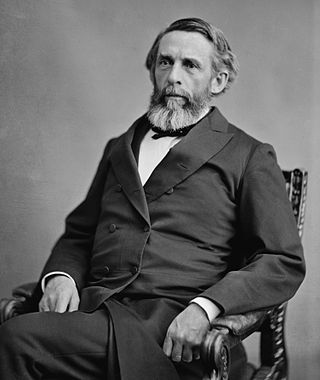
George Frisbie Hoar was an American attorney and politician who represented Massachusetts in the United States Senate from 1877 to 1904. He belonged to an extended family that became politically prominent in 18th- and 19th-century New England.

George Sewall Boutwell was an American politician, lawyer, and statesman from Massachusetts. He served as Secretary of the Treasury under U.S. President Ulysses S. Grant, the 20th Governor of Massachusetts, a Senator and Representative from Massachusetts and the first Commissioner of Internal Revenue under President Abraham Lincoln. He was a leader in the impeachment of U.S. President Andrew Johnson, and served as a House manager (prosecutor) in the impeachment trial.

Frederick Huntington Gillett was an American politician who served as the 42nd Speaker of the United States House of Representatives from 1921-1925 and as a U.S. Senator from Massachusetts from 1925-1931. A Republican, Gillett first began his career in politics when he served in the Massachusetts House of Representatives from 1890-1891, and would go on to serve in the House from 1893-1925. At the time of his election, he was the oldest individual elected to a first term in the senate, a record that he would hold until Peter Welch's victory in the 2022 United States Senate election in Vermont 98 years later.
The Massachusetts Republican Party (MassGOP) is the Massachusetts branch of the U.S. Republican Party.

The 1862–63 United States Senate elections were held on various dates in various states, occurring during the American Civil War. As these U.S. Senate elections were prior to the ratification of the Seventeenth Amendment in 1913, senators were chosen by state legislatures. Senators were elected over a wide range of time throughout 1862 and 1863, and a seat may have been filled months late or remained vacant due to legislative deadlock. In these elections, terms were up for the senators in Class 1.
The 1887 United States Senate election in Massachusetts was held during January 1887. Republican incumbent Henry L. Dawes was re-elected to a third term over opposition from within his own party, led by former Governor John Davis Long.
The 1851 United States Senate election in Massachusetts was held during January 1851. Free Soil Party candidate Charles Sumner was elected by a coalition of Free-Soil and Democratic legislators over Whig incumbent Robert C. Winthrop, who had been appointed to finish the term of retiring Senator Daniel Webster.
The 1855 United States Senate special election in Massachusetts was held during January 1855. Henry Wilson was elected to fill the remainder of the term left vacant by the resignation of Edward Everett.
The 1873 United States Senate special election in Massachusetts was held in March 1873 to fill the vacancy left by Senator Henry Wilson, who resigned to become Vice President of the United States. George S. Boutwell won the election.
The 1883 United States Senate election in Massachusetts was held in January 1883. Incumbent Republican Senator George Frisbie Hoar was re-elected to a second term in office despite a serious challenge from Democrats and members of his own party.
The 1889 United States Senate election in Massachusetts was held in January 1889. Incumbent Republican Senator George Frisbie Hoar was re-elected to a third term in office with no serious opposition.
The 1895 United States Senate election in Massachusetts was held in January 1895. Incumbent Republican Senator George Frisbie Hoar was re-elected to a fourth term in office.
The 1901 United States Senate election in Massachusetts was held in January 1901. Incumbent Republican Senator George Frisbie Hoar was re-elected to a fifth term in office.

The 1876 Massachusetts gubernatorial election was held on November 7. Incumbent Republican Governor Alexander H. Rice was re-elected to a second term in office over former Minister to Great Britain Charles F. Adams.

The 1878 Massachusetts gubernatorial election was held on November 5. Former acting Governor Thomas Talbot, a Republican, defeated Benjamin Butler, who ran as an independent Greenback candidate with Democratic support. Butler's supporters secured a majority of delegates to the Democratic state convention, but his nomination was rejected by the state party committee after his supporters used violent tactics to exclude anti-Butler delegates from the convention hall.

The George Frisbie Hoar statue is a public monument in Worcester, Massachusetts, United States. Located on the north side of the Worcester City Hall, the monument honors George Frisbie Hoar, a politician from the city. The monument, which consists of a statue designed by Daniel Chester French, was dedicated in 1908.

The 1874 Massachusetts gubernatorial election was held on November 3, 1874. Republican acting Governor Thomas Talbot, who took office after the resignation of William B. Washburn, was defeated by Democrat William Gaston, a former Mayor of Boston.

The 1871 Massachusetts gubernatorial election was held on November 7, 1871. Incumbent Republican Governor William Claflin did not run for a fourth term in office. He was succeeded by Republican U.S. Representative William B. Washburn, who defeated Democrat John Quincy Adams II.

The 1851–52 Massachusetts gubernatorial election consisted of an initial popular vote held on November 10, 1851, followed by a legislative vote conducted on January 12, 1852. Incumbent Democrat Governor George S. Boutwell was reelected to a second term in office. The ultimate task of electing the governor had been placed before the Massachusetts General Court because no candidate received the majority of the vote required for a candidate to be elected through the popular election.

The 1850–51 Massachusetts gubernatorial election consisted of an initial popular held on November 11, 1850 that was followed by a legislative vote that was conducted on January 11, 1851. It saw the election of Democratic Party nominee Emory Washburn. The ultimate task of electing the governor had been placed before the Massachusetts General Court because no candidate received the majority of the vote required for a candidate to be elected through the popular election.










